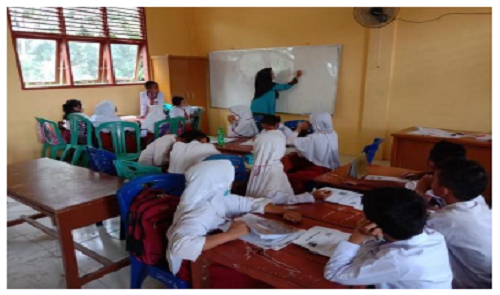
Application of the Team-Assisted Individualization Learning Model to Improve Students' Critical Thinking Skills in Mathematics in Fourth Grade Elementary Schools
Abstract
This study describes the improvement of the Team Assisted Individualization learning model in the fourth grade of SD Negeri 028 Kubang Jaya in improving students' mathematical critical thinking skills. This research is classroom action research, which consists of two cycles. The subjects in this study were one teacher and fifteen fourth-grade students at 028 Kubang Jaya Elementary School. Data collection was carried out through observation, testing, and documentation, with qualitative data analysis using percentages. Based on the research results and data analysis, it was shown that before the action, 11 (73%) students were in the less critical category, and 3 (20%) students were in the critical category. 6.6% of students are in the quite critical category. Team-assisted, individualized learning applies remedial actions. After taking corrective action with the team-assisted individualization learning model. Then corrective action is taken with the team-assisted individualization learning model. In cycle I, students' critical thinking skills increased; 6 students, or 40%, were in the critical category, and 9 students, or 60%, were in the moderately critical category. Furthermore, in cycle II, the ability to think critically has increased: 8 students, or 53%, are in the very critical category, 4 students, or 26%, are in the moderately critical category, and 3 students, or 20%, are in the critical category. In cycle II, students' critical thinking skills have achieved the target success of the action set. Thus, it can be concluded that the application of the team-assisted individualization learning model can improve students' critical thinking skills in fourth-grade mathematics at Public Elementary School 028 Kubang Jaya.
Keywords
Full Text:
PDFReferences
Depdiknas. (2003). Kumpulan Pedoman Kurikulum 2004. Jakarta: Puskur. Dit. PTKSD.
Kamarullah, K. (2017). Pendidikan matematika di sekolah kita. Al Khawarizmi: Jurnal Pendidikan Dan Pembelajaran Matematika, 1(1), 21-32.
Karim, K., & Normaya, N. Kemampuan Berpikir Kritis Siswa dalam Pembelajaran dalam Pembelajaran Matematika dengan Menggunakan Model Jucama di Sekolah Menengah Pertama. EDU-MAT: Jurnal Pendidikan Matematika, 3(1).
Kemendikbud. (2013). Kerangka Dasar dan Struktur Kurikulum 2013. Jakarta: Kemendikbud.
Melly Andriani, M. H. (2013). Pembelajaran Matematika SD/MI. Pekanbaru: Benteng Media
Mustofa, M. H. (2018). Penggunaan Model Pembelajaran Kooperatif Tipe Team Assisted Individualization (TAI) Dalam Meningkatkan Hasil Belajar Siswa.
Redhana, I. W. (2019). Mengembangkan keterampilan abad ke-21 dalam pembelajaran kimia. Jurnal Inovasi Pendidikan Kimia, 13(1).
Sulistiani, E., & Masrukan, M. (2017, February). Pentingnya berpikir kritis dalam pembelajaran matematika untuk menghadapi tantangan MEA. In PRISMA, Prosiding Seminar Nasional Matematika (pp. 605-612).
Wendra, B., Nurhayati, N., & El Hilali, H. (2020). Efektivitas Model Pembelajaran Team Assisted Individualization Terhadap Kemampuan Berpikir Kritis Matematis Peserta Didik SMA. Square: Journal of Mathematics and Mathematics Education, 2(1), 33-40.
Wijayanti, R. R., Relmasira, S. C., & Juneau, J. L. (2018). Penerapan Model Pembelajaran Cooperative Tipe TAI (Team Assisted Individualization) untuk Meningkatkan Hasil Belajar dan Kemampuan Berpikir Kritis Matematika. Jurnal Ilmiah Sekolah Dasar, 2(4), 412-419.
Yundiana, Y., Nurdiana, A., & Hestinova, M. (2020). Model Pembelajaran Team Assisted Individualization dan Kemampuan Pemecahan Masalah Matematika Siswa Kelas VIII. Indiktika: Jurnal Inovasi Pendidikan Matematika, 2(2), 189-197.
DOI: http://dx.doi.org/10.31258/jes.7.2.p.224-232
Refbacks
- There are currently no refbacks.
Copyright (c) 2023 ADE MUSTIKA ANDARI

This work is licensed under a Creative Commons Attribution 4.0 International License.
Publisher: FKIP Universitas Riau












